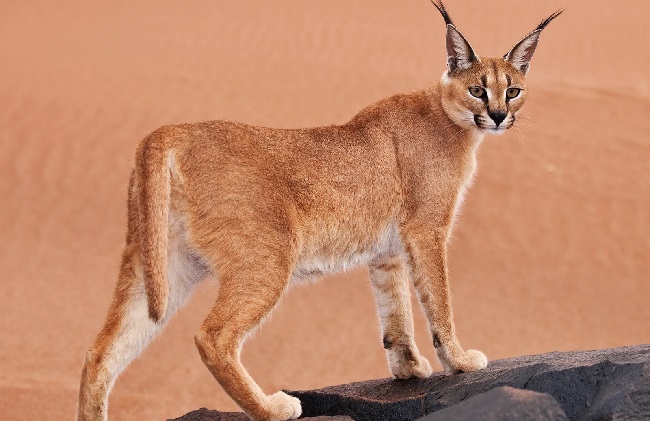The Caracal, a medium-sized wild cat native to Africa, the Middle East, Central Asia, and India, is known for its striking appearance and agile hunting skills.
These captivating creatures, with their characteristic long, tufted ears and muscular build, have recently gained attention as exotic pets.
However, owning a Caracal is not as simple as it might seem. This article explores the legality, ethics, and frequently asked questions surrounding Caracal pet ownership.

Legality of Owning a Caracal Pet
Before considering a Caracal as a pet, it’s crucial to understand the laws and regulations governing exotic pet ownership in your region.
Read Also:
International Laws
Internationally, the trade of Caracals is regulated by the Convention on International Trade in Endangered Species (CITES), as the Caracal is classified as a species of least concern. However, export permits are required, and some countries have stricter rules.
Domestic Laws
In the United States, the legality of owning a Caracal varies by state. Some states like Nevada allow Caracals with proper permits, while others, like California and Georgia, prohibit them completely. Always check local and state laws before proceeding.
Ethical Considerations of Owning a Caracal
The decision to own a Caracal goes beyond legal considerations; potential owners should also examine the ethical implications.
Conservation and Welfare
Caracals are wild animals, and removing them from their natural habitats can contribute to declines in wild populations. Captive environments often fail to meet the complex physical and behavioral needs of these wild cats, leading to welfare issues.
Safety Concerns
Caracals, though beautiful, are powerful and potentially dangerous animals. They may pose risks to human safety, particularly in households with children or other pets.
FAQs About Caracal Pet Ownership
Here are some of the topics about caracal pet ownership:
Can Caracals Be Domesticated?
While Caracals can be tamed to a degree, they are not domestic animals and retain many wild behaviors. They require a lot of space and mental stimulation and can exhibit destructive behavior if these needs are not met.
What Do Caracals Eat?
In the wild, Caracals are carnivorous, hunting rodents, birds, and small mammals. As pets, they require a diet that closely mimics this, usually consisting of high-quality, raw meat, and specialized supplements.
How Much Does a Caracal Cost?
The initial cost of a Caracal can range from $1,500 to $15,000, depending on the breeder. However, potential owners must also consider the ongoing costs of feeding, housing, and providing veterinary care for these animals, which can be substantial.
Behavior and Temperament of Caracals as Pets
Understanding a Caracal’s behavior is critical for anyone considering these majestic creatures as pets.
Natural Predatory Instincts
Caracals are born hunters. In the wild, they are solitary and territorial animals. Their impressive leaping ability, agility, and speed equip them well for capturing prey. When kept as pets, these instincts don’t disappear. Toys and interactive activities can help to keep them mentally stimulated, but owners should be prepared for instinctual hunting behaviors.
Interaction with Humans and Other Pets
While some Caracals may develop strong bonds with their human caregivers, they are not naturally sociable animals like domestic cats or dogs.
Their interactions with other household pets, especially smaller ones, could be problematic due to their natural predatory instincts.
Aggression and Destructive Behaviors
In some instances, Caracals can show signs of aggression. They can become especially destructive if they are bored or anxious, leading to potential damage within the home. Adequate space and enriching activities are crucial for maintaining their wellbeing.
The Care and Maintenance of a Caracal Pet
A Caracal’s needs go beyond those of typical household pets. Potential owners should consider the following:
Housing Requirements
Caracals need a lot of space. Ideally, they should have access to a large, secure outdoor enclosure where they can express their natural behaviors. The enclosure should have climbing platforms, hiding places, and toys for enrichment.
Health Care
Specialist exotic animal veterinarians are needed to provide appropriate health care for Caracals. They require regular vaccinations and parasite control, just like domestic cats. Given their size and potential aggression, routine health checks can be challenging and should be conducted by experienced professionals.
Ethical Breeding and Acquisition of Caracals
If you’ve considered all aspects and decided to go ahead with acquiring a Caracal, it’s crucial to do so responsibly.
Avoiding Wild Caught Specimens
Never purchase a Caracal that has been caught from the wild. The trade in wild-caught animals contributes to population declines and often involves significant animal welfare issues.
Responsible Breeding
Purchase your Caracal from a reputable breeder who prioritizes the welfare of their animals. Reputable breeders should be able to provide evidence of responsible breeding practices, including health checks and good living conditions for their animals.
Read Also:
Conclusion
While Caracals are undeniably captivating creatures, the decision to keep one as a pet should not be taken lightly. Prospective owners must consider not only the legal implications but also the ethical considerations and the extensive commitment involved in caring for such an exotic animal.
Owning a Caracal requires extensive resources, deep understanding of the species, and a dedication to providing a life that approximates their wild existence as closely as possible.
























